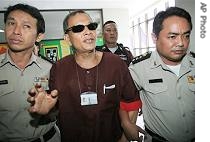2006年VOA标准英语-Dissident Numbers Grow in Vietnam(在线收听)
By Matt Steinglass
Hanoi
16 October 2006
 Ly Tong, center, a South Vietnamese air force veteran who later became a US citizen, talks to reporters at Criminal Court in Bangkok, September 7, 2006 |
||
----
On October 12, a group of Vietnamese dissidents issued an open letter to the leaders of the Asia Pacific Economic Cooperation, or APEC, which will hold its annual summit in Hanoi in November. The letter called on foreign leaders to "support us, in contributing to the promotion of democracy in Vietnam."
The group calls itself Bloc 8406, after the date of its manifesto, which was issued on the 8th of April 2006. Titled the "Manifesto for Freedom and Democracy in Vietnam," it has so far attracted more than two thousand signatures.
The dissidents include Nguyen Khac Toan, a 55-year-old former army officer and businessman who was convicted of espionage in 2002 for corresponding with Vietnamese opposition organizations in France.
Toan was released from prison in an amnesty last January, but he is not allowed to leave his neighborhood in downtown Hanoi until the end of 2008.
Still, he continues his political activities. In mid-August, he and a small group of others tried to publish a pro-democracy newspaper. As Toan explains, the effort was cut short by the police.
Toan says he and other dissidents were repeatedly interrogated by the police, and had their computers and memory devices confiscated.
Now, Toan and his fellow dissidents are trying to form a national organization.
He says the new group will unite all pro-democracy forces, as a counterweight to the Communist Party.
Nguyen Van Dai, a lawyer who represents many of the dissidents, says they would like to see their country become more like South Korea.
Dai says South Korea is the best model for Vietnam: an Asian country that made a peaceful transition from dictatorship to democracy.
Despite their grand ambitions, the dissidents comprise just a few tiny groups. They are never mentioned in the state-controlled press. Few Vietnamese even know they exist, apart from those who have come across their Web sites.
But the activism of Bloc 8406 does reflect a trend: more and more Vietnamese are managing to find ways around the government's control of information and ideas.
The dissidents include 83-year-old Hoang Minh Chinh, former head of the Communist Party's political academy, and the 77-year-old Buddhist monk Thich Quang Do. Both have opposed the communist regime for decades.
A second generation of dissidents was inspired by the wave of democratization in Eastern Europe in the late 1980's and early '90's. Forty-year-old Nguyen Chu Linh was a student in Prague during Czechoslosvakia's 1989 "Velvet Revolution." Dai, the lawyer, was working at a factory in East Germany when the Berlin Wall fell in 1989.
Now, a new generation of Vietnamese is being exposed to political ideas, either through the Internet or studies abroad. They include people such as Nguyen Tien Trung, who lost his faith in Vietnam's communist system while attending university in France.
"In France, for example, my school, I don't have political subjects. Like Marxism-Leninism. But in Vietnam, my friends in polytechnic university, they must spend much time to learn political subjects," he said. "So I think it's one reason that the quality of education in Vietnam is not good enough."
Trung criticized the ideological nature of Vietnamese education last March in a scathing open letter to Vietnam's minister of education. The letter was widely circulated by e-mail, and Trung now runs a Web site called "Democratic Youth of Vietnam." He says foreign universities are prime recruiting grounds for new dissidents.
"All the Vietnamese students, when they have the occasion to go abroad, they understand the reality, and they want the true democracy for Vietnam," he added.
Vietnam's press, while it has grown freer in recent years, is controlled by the state. And government officials marginalize the dissidents by refusing to acknowledge them. Government spokesman Le Dung denied any knowledge of Bloc 8406, referring to it only in veiled terms.
Dung says that recently, some individuals have used the label "democracy" to distort the situation in Vietnam, harming the interests of the Vietnamese people.
Part of the dissidents' problem is that most young Vietnamese appear to be happy with their government. The country has experienced rapid economic growth over the past decade, and for most Vietnamese, being proud of their country means supporting the leaders and the Party.
In front of Ho Chi Minh's mausoleum in Hanoi, children sing praises to the country's founding father. At the nearby Ho Chi Minh museum, a number of young students said they supported the country's leadership.
This student from the prestigious Hanoi University of Technology says demonstrating against the government is wrong, and it is a citizen's duty to support the country's leadership.
Still, the dissidents remain hopeful. Lawyer Nguyen Van Dai insists the country is on the verge of a big change.
Dai says he is sure that in the near future, Vietnam will become a democratic country.
Just how this might come about, neither Dai nor his fellow dissidents are able to say.